Recording Arts as Reengagement, Social Justice and Pathway
Key Points
-
After a successful career as a recording artist, David “TC” Ellis created Studio 4 in St. Paul to spot budding music stars.
-
It became a hangout spot for creative young people, most of whom had “dropped out of school due to boredom and a sense that school wasn’t relevant to their lives and dreams.”
-
Ellis and colleagues then opened the High School for Recording Arts in 1998.
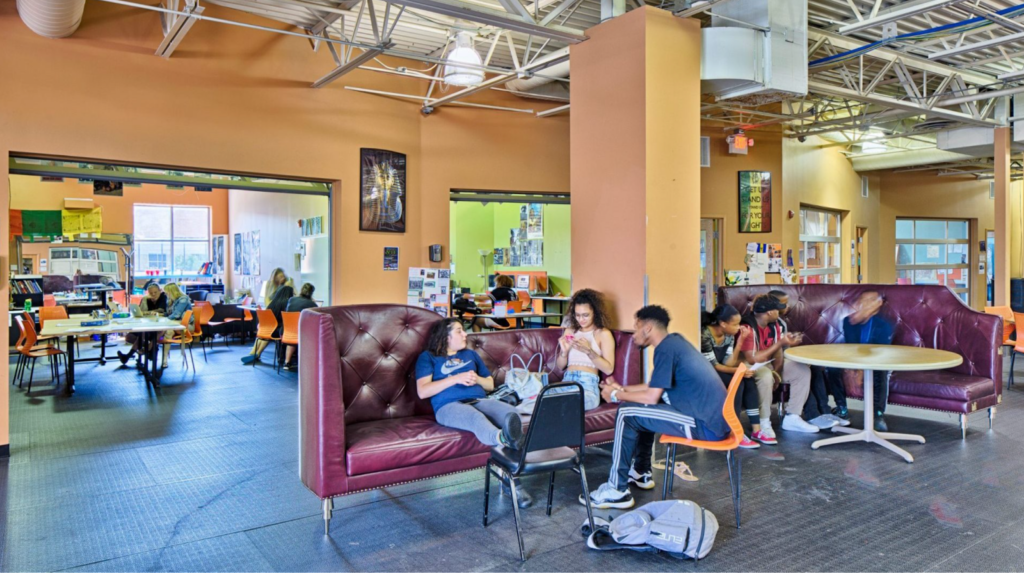
After a successful career as a recording artist, David “TC” Ellis created Studio 4 in St. Paul to spot budding music stars. It became a hangout spot for creative young people, most of whom had “dropped out of school due to boredom and a sense that school wasn’t relevant to their lives and dreams.”
Ellis began thinking about a new kind of high school that would reengage learners through musicology and “put them on a positive tangent.” He created a pilot program for 15 learners in 1996. After being blown away by their genius and with the support of community groups, Minnesota’s early charter school policy, and a grant from Edvisions, Ellis and colleagues opened the High School for Recording Arts in 1998.
For Ellis, it was spiritual and for the students, HSRA became a haven. HSRA now serves about 320 students with personalized project-based learning through an asset-based approach. Through the lens of Family, Respect, Community and Education, most students engage in courses that teach music production and the business of music. HSRA provides state-of-the-art music production facilities including two recording studios, practice rooms and a live performance room.
HSRA students also hone their business acumen through the first student-run record level. Another Level Records is a student-operated music record label that empowers firsthand experience in developing media content, negotiating contracts, and publishing music by HSRA students and other artists (See Four Seasons MacPhail Project).
HSRA understands that the work doesn’t happen without deliberate patience, authentic relationship building and bringing in adults that value deep diversity. Modeling the change agents that HSRA wants learners to become, a strong focus is placed on community partners serving as advisors to allow teachers to focus on teaching. HRSA has a staff of (non-teaching) advisors each with dedicated space (Delta and Beta1 advisory shown above). Advisors check in with students in the morning and host an advisory period for an hour after lunch. The advisory space is open all day as an alternative to class for students that need extra support. Advisors support at least 4 college visits and help all learners fill out FAFSA forms. Two social workers provide additional youth and family support.
The need to develop a building that catered to the HSRA model led to a partnership with Fielding International. Through multiple renovations, Fielding International worked with HSRA to adapt a commercial building into a unique learning environment that’s divided into advisories around a central learning commons.
The design process began with sharing personal stories about the creative process between students and architects, finding common ground. Fielding listened to their music and developed an understanding of the student’s desire to express themselves through performance. The architect also developed an understanding of their need for a safe space, and secure enough to be their best selves.
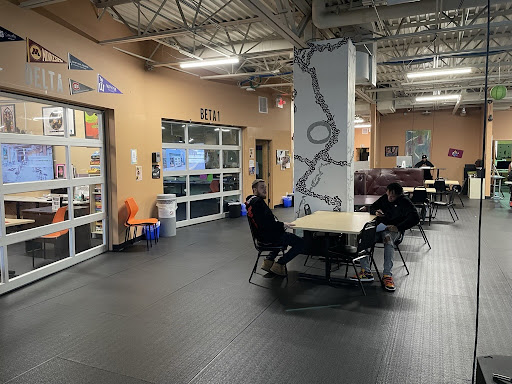
The centerpiece of the school is the Learning Commons, also known as “The Black Top,” equipped with a large Live Studio, smaller collaborative suites for engineers and performers, and a pre-production commons, that provide students with the necessary tools to produce high-quality work. The gym’s fold-down stage further enables them to showcase their talents in all-school and community performances.
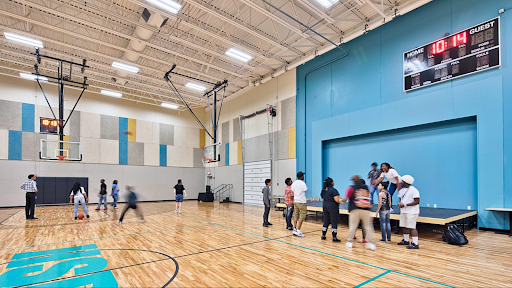
There is no shortage of talent that contributes to the success of HSRA. In 2011, sam seidel published Hip Hop Genius: Remixing High School Education, the story of the first decade of HSRA. In 2021, seidel, the Director of the K12 Lab at the Stanford d.school, released the 10-year anniversary edition Hip-Hop Genius 2.0: Remixing High School Education with forewords from Gloria Ladson-Billings and D Smoke, and contributions from David “TC” Ellis, Tony Simmons, and Michael Lipset who reflected on leading HSRA through its second decade.
Tony Simmons joined Ellis at Studio 4 in 2001 and became Executive Director of HSRA in 2013. With 60% of learners’ justice-involved, Simmons thinks of HSRA as a re-engagement school that is asset-based with full wrap-around services.
Tony Simmons and Michael Lipset are sharing the successful elements of HSRA through 4 Learning. The sister organization to HSRA helps schools reengage young people through the application of the recording arts and other creative endeavors. They share creative programming and studio design strategies with educators creating career pathways and microschools.
4Learning Sites
Timothy David Jones, Founder of Techniques4Learning and Chief Visionary Officer for HipHopEd, Inc. is HSRA’s Director of Innovation & Hip Hop Pedagogy (see podcast). Jones uses his skills and frameworks to promote the intersections of hip-hop, youth development and education. He facilitated an activity with us by having us read and listen to a song by Dave East entitled “On My Way 2 School.” The song depicts what happens as two brothers navigate their neighborhood on the way to school. The song ends with an interaction between Dave East and a teacher who talks down to him with no recognition of the realities that surround the school where he teaches and shapes the students that enter the building. After a spirited conversation about what can be done within our schools to be more connected to realities that students face on the way to school, we entered the studio where some students had listened and discussed the same song and were recording verses of their own. The impromptu song wasn’t complete until there were contributions made by Timothy and TC Ellis. (On My Way 2 School HSRA Remix).



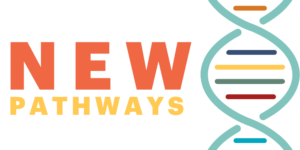
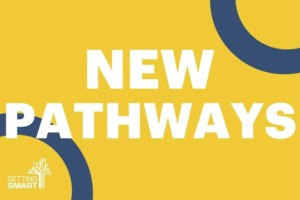
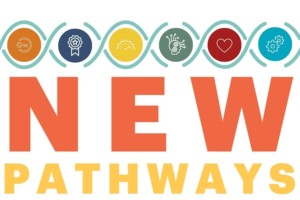
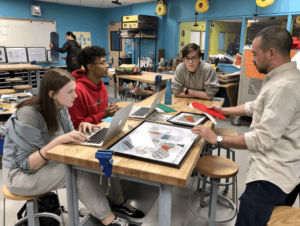
0 Comments
Leave a Comment
Your email address will not be published. All fields are required.